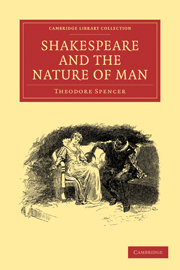Book contents
- Frontmatter
- Preface
- Contents
- SHAKESPEARE and THE NATURE OF MAN
- I Man in Nature: the Optimistic Theory
- II Man in Nature: the Renaissance Conflict
- III The Dramatic Convention and Shakespeare's Early Use of It
- IV Hamlet and Troilus and Cressida
- V Othello and King Lear
- VI Macbeth and Antony and Cleopatra
- VII Shakespeare's Last Plays
- VIII Literature and the Nature of Man
- Index
II - Man in Nature: the Renaissance Conflict
Published online by Cambridge University Press: 07 September 2010
- Frontmatter
- Preface
- Contents
- SHAKESPEARE and THE NATURE OF MAN
- I Man in Nature: the Optimistic Theory
- II Man in Nature: the Renaissance Conflict
- III The Dramatic Convention and Shakespeare's Early Use of It
- IV Hamlet and Troilus and Cressida
- V Othello and King Lear
- VI Macbeth and Antony and Cleopatra
- VII Shakespeare's Last Plays
- VIII Literature and the Nature of Man
- Index
Summary
I have so far emphasized as strongly as I could the essential unity of the three inter-related hierarchies which made up the optimistic sixteenth-century picture of man's nature. Each one of them reflected the order of Nature's rule, and to think of one was almost automatically to think of the others. No one expressed this fact better than Shakespeare: Ulysses' famous speech on order, in Troilus and Cressida, sums up nearly everything the Elizabethans felt about the matter. Ulysses is explaining why the Greeks have been so unsuccessful in their war against Troy. The trouble is, he says, that “the specialty of rule [the particular function of government] hath been neglected,” and there has not been enough order in the administration of the Greek army. He first draws a parallel with the heavens, then with civil law, then with the four elements, then with natural and moral law, and finally with psychological law. Everything is inter-related and seen as part of the same scheme, obeying the same rules:
The heavens themselves, the planets, and this centre
Observe degree, priority, and place,
Insisture, course, proportion, season, form,
Office, and custom, in all line of order:
And therefore is the glorious planet Sol
In noble eminence enthron'd and spher'd
Amidst the other; whose med'cinable eye
Corrects the ill aspects of planets evil
And posts, like the commandment of a king,
Sans check, to good and bad: but when the planets
In evil mixture to disorder wander,
What plagues, and what portents, what mutiny,
What raging of the sea, shaking of earth,
Commotion in the winds, frights, changes, horrors,
Divert and crack, rend and deracinate
The unity and married calm of states
Quite from their fixure! O! when degree is shak'd,
Which is the ladder to all high designs, […]
- Type
- Chapter
- Information
- Shakespeare and the Nature of Man , pp. 21 - 50Publisher: Cambridge University PressPrint publication year: 2009First published in: 1943



